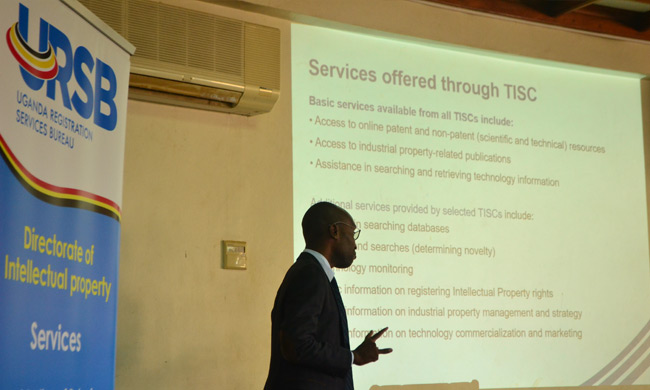Ignited by the knowledge and information tips received during the training workshop, participants advised Makerere University Directorate of Research and Graduate Training and the Uganda Registration Services Bureau to undertake a University wide sensitization programme on intellectual property and its benefits.
“The training workshop has been very useful. It has demystified the idea that intellectual property is complex. We can now testify that intellectual property is very simple. With the knowledge, research and innovations that we generate and/or undertake, the University, researchers and innovators will mutually benefit. We thank the Makerere University Directorate of Research and Graduate Training and the Uganda Registration Services Bureau for the training on intellectual property and its benefits. We recommend that the sensitization programme is extended to staff and students at College level.”
The participants comprising Makerere University Senior Management, Senior Researchers, Principals, Deputy Principals, Deans, Directors, Heads of Units and Staff from the Directorate of Research and Graduate Training emphasized that when staff and students are sensitized on intellectual property and its benefits, the University will be in position to build capacity in intellectual property management, establish intellectual management committees at Unit levels, and explore possibilities of teaching intellectual property management as a cross cutting course.
Addressing the participants on Thursday 7th July 2016, the Director of Research and Graduate Training at Makerere University, Prof. Buyinza Mukadasi thanked Uganda Registration Services Bureau for choosing to partner with Makerere University to create awareness on intellectual Property and its benefits; and identification of areas of collaboration aimed at promoting intellectual property in Makerere University and Uganda at large.

Professor Buyinza Mukadasi said the sensitization programmes on intellectual property and its benefits that will be rolled out to different colleges will provide an opportunity for staff and students to understand and appreciate the sections contained in the Makerere University Intellectual Property Management Policy approved by the University Council in March 2008.
“When staff fully understands the Makerere University Intellectual Property Management Policy, they will be able to appreciate the relevance and value of their work. The Makerere University Intellectual Property Management Policy is intended to promote innovative ideas and nurture them for full potential of development and commercialization,” he said.
Prof. Buyinza Mukasasi commended the partnership with Uganda Registration Services Bureau. He emphasized that it is only through formal registration that the University shall transform the science into technologies that can be beneficial to the society and the wider public.
The Director of Intellectual Property Right at the Uganda Registration Services Bureau, Ms. Fiona Bayiga reiterated their commitment to supporting Makerere University in intellectual property management.
“We are really humbled to be here for this training and we promise to continue offering all possible support to Makerere University when we are called upon. We are aware that Makerere has a policy on Intellectual Property Management. We are therefore prepared to support Makerere University in realizing the implementation of this policy,” she said.
Intellectual property rights are the rights given to persons over the creation of their minds. They usually give the creator an exclusive right over the use of his/her creation for a certain period of time.
In a presentation, the Senior Registration Officer-Intellectual Property at the Uganda Registration Services Bureau, Mr. Kalibbala Nyanja Philip highlighted that Intellectual Property ensures that creativity from the human mind is recognised and rewarded.

“The concept of Intellectual Property also requires that those who create benefit. Let the minds that have gone into creativity and innovation get rewarded for it. There should be a commercial benefit. So Intellectual Property encourages societies to CREATE, RECOGNIZE AND BENEFIT,” he said.
Speaking on patent right, the Senior Examiner- Patent at Uganda Registration Services Bureau, Mr. Kaggwa John Marius encouraged Makerere University staff to patent/register their innovations and creative ideas. This would protect individuals from commercially exploiting their work for at least a certain period of time. According to Mr. Kaggwa, by granting the inventor a temporary monopoly in exchange for a full description of how to perform the invention, patents play a key role in developing industry in the world.
“A patent is an exclusive right given by law to inventors to make use of and exploit their inventions for a limited period of time usually not more than 20 years. Once the owner of an invention has been granted a patent in any particular country, they have the legal authority to exclude others from making, using, or selling the claimed invention in that country without their consent, for a fixed period of time. In this way, inventors can prevent others from benefiting from their ingenuity and ultimately sharing profits from the invention, without their permission for a certain period of time. When this period expires, the public has the liberty to exploit the invention without authorization,” he explained.
Mr. Kaggwa also advised Makerere University staff on the role of the Technological and Innovations Support Centers (TISC). “Technological and Innovations Support Centers were designed to provide to innovators and researchers in developing countries with access to higher education, quality technological information and other related services in order to stimulate economic growth.”
The training workshop was held on Thursday 7th July 2016 at Makerere University.
Article by: Makerere University Public Relations Office


 General1 week ago
General1 week ago
 Natural Sciences1 week ago
Natural Sciences1 week ago
 Agriculture & Environment6 days ago
Agriculture & Environment6 days ago
 Health1 week ago
Health1 week ago
 Health1 week ago
Health1 week ago


